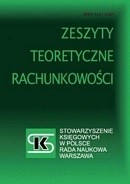O średniowiecznej moralności kupieckiej i etyce
zawodowej rachunkowości: perspektywa teorii
społecznej Michela Foucaulta
On medieval mercantile morality and ethics of the accounting profession: the perspective of Michel
Foucault's social theory
Author(s): Mikołaj TurzyńskiSubject(s): Economy
Published by: Stowarzyszenie Księgowych w Polsce
Keywords: accounting ethics; mercantile ethics; monastic rules; M. Foucault’s theory of power
Summary/Abstract: The purpose of this article is to identify and systematize analogies and similarities between the disciplinary order characteristic of monasteries and medieval concepts of accounting ethics being part of merchant morality. The thesis of the article is as follows: late medieval and renaissance mercantile morality concepts, including accounting ethics, had referred to the religious rules, to promote the acceptance of the merchant and accounting professions by the society. The research perspective used in this article was M. Foucault’s theory of pastoral power. The study included medieval texts: the work of Benedict Cotruglio Il libro dell'arte di mercatura and Matthew of Cracow De translatione rerum temporalium, mostly known under the general title De contractibus (2011). For the purpose of identification and explanation of the relationship between the disciplinary order characteristic of the monasteries and the concepts of accounting ethics, the Rule of the Master and the Rule of St. Benedict was chosen. The presented results justify the thesis of the article. Monastic rules and principles of merchant morality (including accounting ethics) have many characteristics in common. M. Foucault’s social theory, especially the concept of pastoral power, facilitates identification and systematization of these rules.
Journal: Zeszyty Teoretyczne Rachunkowości
- Issue Year: 2013
- Issue No: 73
- Page Range: 131-146
- Page Count: 15
- Language: Polish

